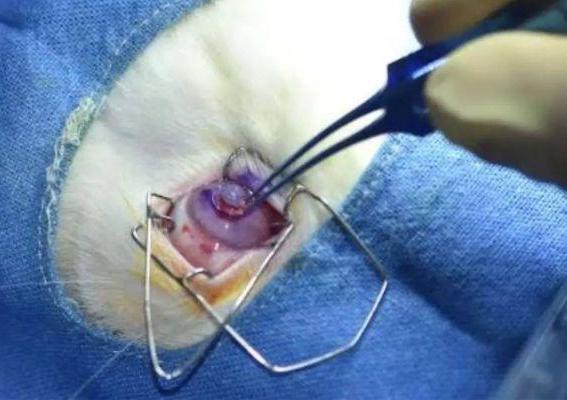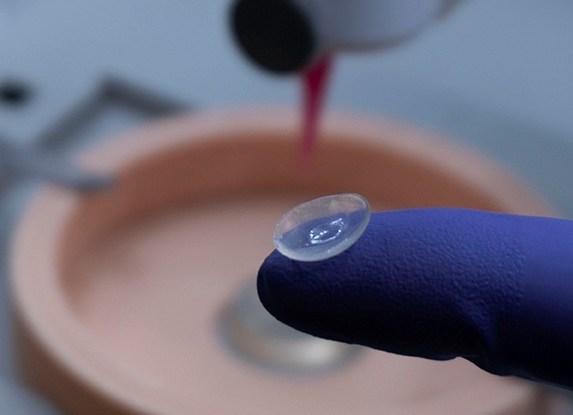17 August 2022 3D printed corneas, a collaboration between India's LV Prasad Eye Institute (LVPEI), the Indian Institute of Technology (IIT) Hyderabad and the Centre for Cellular and Molecular Biology, have been successfully tested on animals.

Δ3D-printed corneas transplanted into rabbits' eyes
The team claims that the artificial material and animal residue-free corneas, made from bio-ink derived from human donor tissue, have been successfully transplanted into the eyes of rabbits with 3D-printed corneas. As the cornea is based on a "completely natural" basis, the developers of the corneal implant say it could soon be "used in humans" to treat corneal scarring as well as other serious eye diseases that can lead to blindness.
"This is the first human cornea manufactured by 3D printing that is optically and physically suitable for transplantation," said Dr Sayan Basu and Dr Vivken Singh, lead researchers at LVPEI." The bio-ink used to create this 3D printed cornea has a wide range of applications, such as for soldiers injured by eye injuries in warfare, to seal corneal perforations and prevent infection, or in remote areas where specialist eye centres are not available."

△The technology is being further prepared for clinical trials through translational research
Why research bio-3D printed corneas?
The cornea is transparent in the eye, it covers the iris and pupil and is generally elastic and able to heal from minor abrasions, however, incorrect use of contact lenses can lead to scarring of the cornea. Even those who lead a healthy lifestyle and take great care of their eyes can fall victim to problems such as corneal dystrophy, which can lead to blurred vision and can be passed on to the next generation in particular.
Although corneal substitutes are being actively researched around the world, they are either animal-based or synthetic. According to the National Eye Institute, the main remedies used to treat keratoconus remain laser treatment, or transplantation of organic or artificial tissue. However, while prostheses do not restore the patient's vision, cell-based transplants are often derived from animals, but the biggest problem is that this approach carries a certain risk of rejection, and is very unsuitable for some religious countries (e.g. India, etc.).
Bio-3D printing technology
To get around the cultural issues surrounding the use of certain animals and religions in eye implants, the researchers based their research on human donor tissue instead. Specifically, the team developed a biometric hydrogel using decellularised corneal tissue stroma and stem cells extracted from human eyes.
The material is completely free of synthetic components and is designed to provide an ideal microenvironment for stromal regeneration. In fact, says Dr Falguni Pati, Associate Professor at IIT-Hyderabad, "This bio-ink is even able to maintain the curvature and thickness of the bioprinted cornea at the same time, thereby facilitating implantation."
The team claims that the procedure is going very well, and Dr Sayan Basu and Dr Vivken Singh of LVPEI say, "Bioprinting will soon prove useful in treating conditions such as ocular scarring, or cone corneas, as keratitis can cause considerable vision problems."
As with other development work on the implant, translational research in preparation for further clinical trials will be supported by the Sree Padmavathi Venkateswara Fund. The team hopes that this technology, will contribute to a more composite national context and cheaper corneal transplants in the country.

ΔPandorum Technologies' 3D printed corneal stromal lens
3D printing technology has been used to restore vision
Going further back in time, Bangalore-based Pandorum Technologies, 3D bioprinted corneal tissue in 2019, that was designed to allow for scarless healing of wounds in the eye. At the time, the company's 3D printed corneal stromal lens was seen as a potential way to treat those with corneal disease, which causes vision loss, without having to rely on a human donor.
In a more practical application, surgeons at Israel's Shaare Zedek Medical Centre (SZMC) successfully performed the world's, thinnest artificial cornea transplant earlier this year. The 50-micron-thick implant, developed by EyeYon, was used to restore a local patient's vision, significantly reducing his waiting time for surgery.





